The path to peace in Afghanistan
The war in Afghanistan is now the longest in the United States' history, with thousands of lives lost
November 11, 2019
With an astronomical cost that rises by the day, the Afghanistan War can only end through one route - diplomacy.
When the results of the 2016 United States presidential election were revealed, to the world's shock and surprise, Professor Theo Farrell was having breakfast with the Taliban.
On the surface, it was an unlikely scene. But it was, in fact, the third time Professor Farrell had met with members of the insurgent group in a far-flung location.
This time, in early November 2016, he was on a remote corner of an island in the Pacific, which can't be named for security reasons, attempting to ascertain what peace in Afghanistan, if and when it ever came, would involve and how it would look. His Taliban guests were indifferent about the new president-elect of the US.
"They said, 'Trump or Obama. It doesn't matter, they're both as corrupt as the other'," says Professor Farrell, Deputy Vice-Chancellor (Education) and Executive Dean of the Faculty of Law, Humanities and the Arts at the University of Wollongong. "To them, there was no difference between the two."
By that point, Afghanistan had been mired in a bloody conflict for 15 years. President-elect Trump seemed an unlikely dealmaker.
For Professor Farrell, who has devoted much of his career to studying the longest war in history, the answer to peace in Afghanistan sounds relatively simple on the surface - diplomatic talks. He told the crowd at UOW's annual Big Ideas Festival in October that it is the only way through the muck that has come to define the brutal, violent, and senseless war that has dragged on for close to two decades.
"In war, it is better to be talking to your enemy than not," he says. "It might sound self-evident but in many armed conflicts, people don't talk to the other side.
"In the context of the Afghanistan War, the Americans came very late to sit down and have conversations with the Taliban. They were exploring the possibility of talking to the Taliban from about 2010 onwards, but they only decided in a serious way to begin talks with the Taliban in 2012."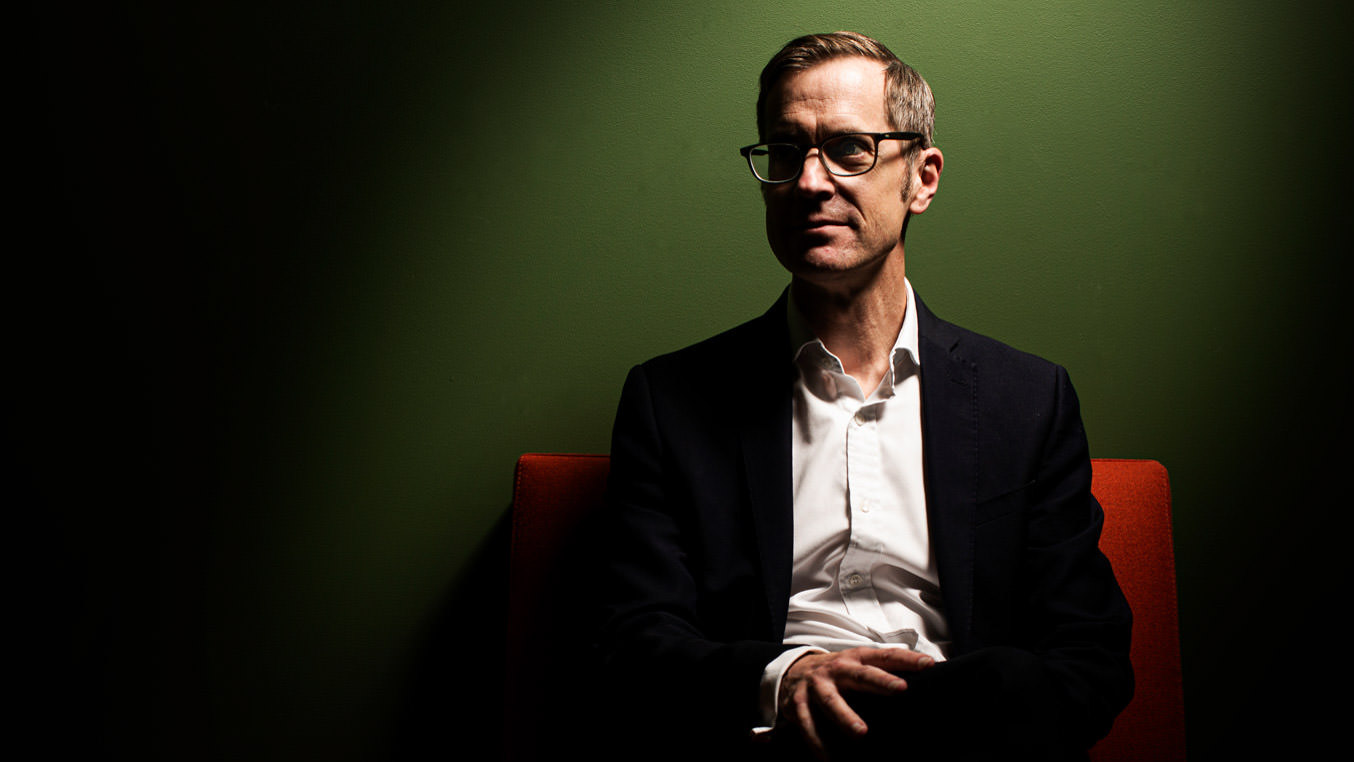
Professor Theo Farrell. Photo: Paul Jones
That was the year Professor Farrell held his first conversation with the insurgent organisation.
But first, a history lesson. On September 11, 2001, Al Qaeda orchestrated the deadliest terrorist attack on American soil when planes hit the Twin Towers in New York City, and crashed into the Pentagon in Washington, DC.
In the aftermath, as the nation, and indeed the world, reeled, the United States demanded that Afghanistan hand over Osama Bin Laden, the mastermind of the attack and the leader of Al Qaeda. Afghanistan refused. Three weeks later, the United States declared war on Al Qaeda in Afghanistan.
In the ensuing years and the ensuing narrative over the war, Al Qaeda and the Taliban have become conflated, but they are distinct groups. Al Qaeda is a terrorist organisation with a hatred of the West and its culture, while the latter is a Pashtun tribal movement focused on politics in Afghanistan.
"Within three months of entering the war, the US had basically defeated Al Qaeda and the Taliban, and the Taliban regime in Afghanistan had collapsed," says Professor Farrell, who has written a book about the conflict, Unwinnable: Britain's War in Afghanistan 2001-2004. "But, what's interesting, is that towards the end of that conflict, the Taliban attempted to surrender, they attempted to negotiate a surrender with the Americans, and the Americans refused. The White House wanted an unconditional surrender.
"By early 2002, the Taliban had fled into Pakistan, they had gone to ground. A great many had been killed by the Americans but that didn't end the conflict. Within two or three years, they were back in Afghanistan, establishing themselves in the rural areas. By 2007, there was an insurgency raging right across the country. Because the Americans didn't negotiate, the Taliban returned and the war started again.
"Thus the war never ended. It just rolled on. The Americans are engaged in a counterterrorism mission that continues to this day. And now, in addition, to the Taliban, they are fighting the Islamic State in Afghanistan."
Seven years ago, Professor Farrell was based at King's College London, as Head of the Department of War Studies (which refers to the interdisciplinary study of armed conflict in all its dimensions). He spent much of his time working with the British Government and the military on the security challenges in the Middle East. It was an area of immense interest for the researcher, whose background is in politics and history; it gave him the chance to focus on international security and its implications for the United Kingdom.
The work put him on the frontline of the diplomatic effort to negotiate peace. In 2012, he took part in the first of three sets of talks that would tentatively start to bridge the gulf between the two sides.
"I was working with a fellow Dubliner, Michael Semple, who is a world-leading authority on the Taliban. He has very extensive links into the Taliban movement. He speaks several of the languages that enable him to have these conversations," Professor Farrell recalls.
"I received funding from the UK Research Council to hold academic workshops with the Taliban. So with Michael's connections into the Taliban and into the White House, and with my connections to military command and the UK, we covered off all areas."
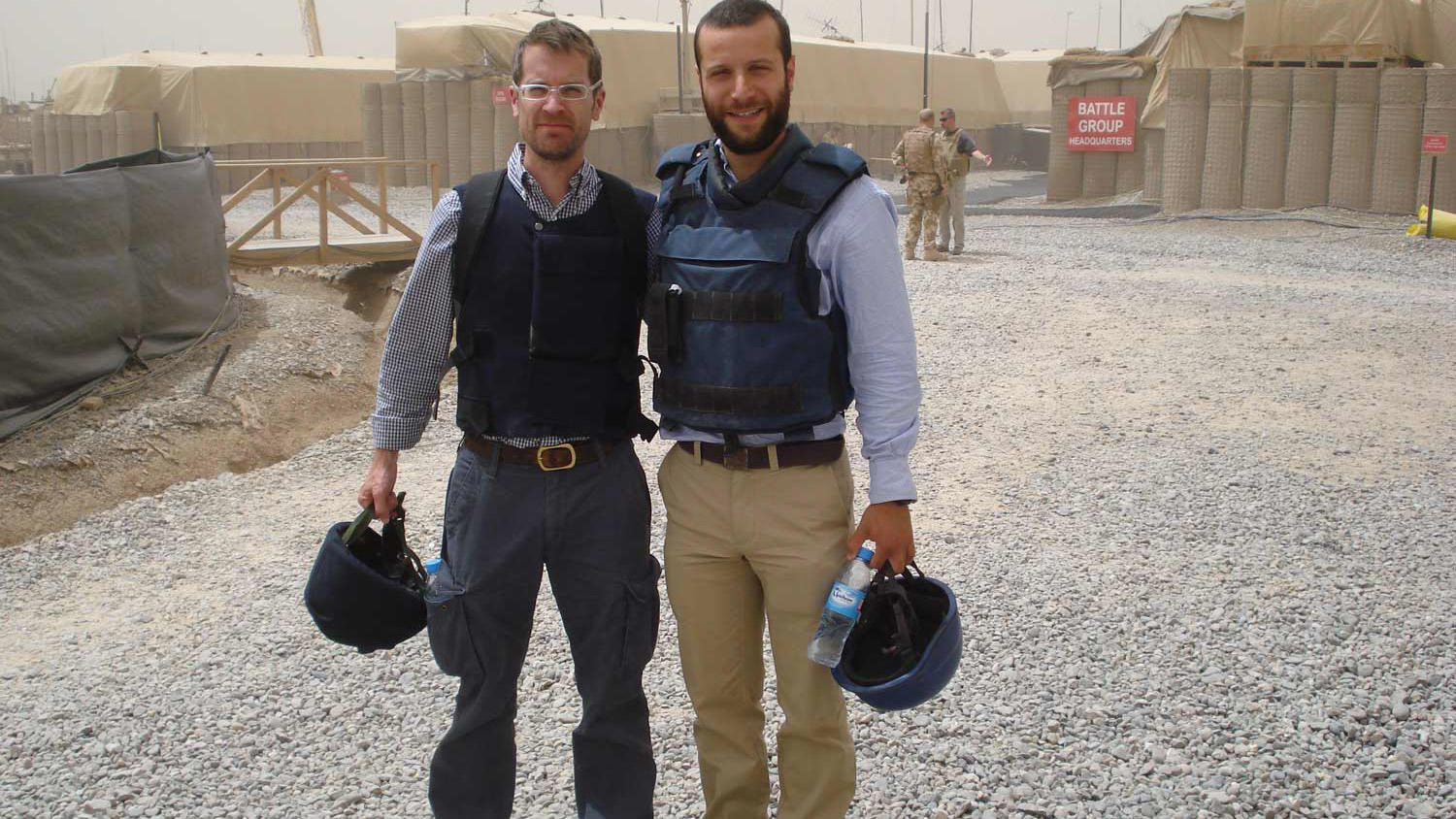
Professor Farrell (left) with British District Officer in Forward Operating Base Shawqat, Nad-e-Ali District, Helmand Province, Afghanistan, 2010.
While Professor Farrell and Mr Semple were ostensibly conducting academic workshops with the Taliban, they were providing a direct communication back to the powers-that-be in London and Washington, DC.
"I've had three sets of talks with the Taliban to explore the possibility of peace. The first two talks were in Dubai, and the final one was in a Pacific island, I'm not able to say where.
"At the time of the first talks, the Americans were about to start their own talks with the Taliban in Doha. But they didn't know what the Taliban's red lines were. The red line is a deal-breaker, so if you cross that red line, you don't have a deal.
"I went to Washington and spoke to people on the National Security Council, and told them I was about to meet with the Taliban. I asked what they want me to find out and they said they needed to know their red lines.
"The Americans' conditions were that the Taliban stop fighting, they stop supporting the Al Qaeda, and they recognise the Afghan government."
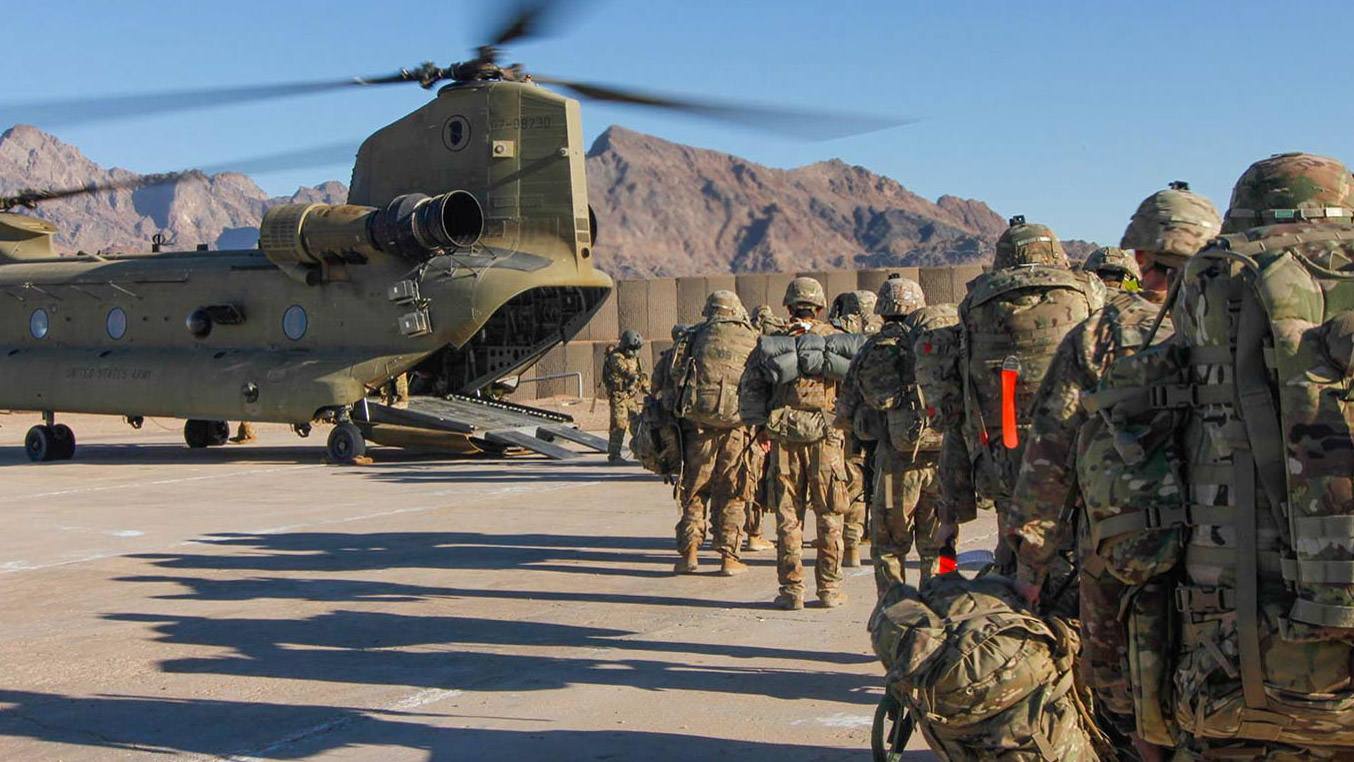
Soldiers assigned to the 101st Resolute Support Sustainment Brigade load onto a Chinook helicopter to head out and execute missions across Afghanistan. Photo: 1st Lt. Verniccia Ford/US Department of Defense
During the first round of peace talks, which Professor Farrell describes as an "incredible experience", the duo was given a glimpse of what it would take to negotiate an accord between the two sides. Despite their public statements to the contrary, the Taliban admitted that they would accept a long-term American counterterrorism force in the country. It came as a surprise to Professor Farrell and Mr Semple, who had long believed this to be a deal breaker for the Taliban.
"Within hours of coming out of those talks, I was writing memos to Number 10 Downing Street, the Director of the CIA, the Joint Chiefs of Staff, and the White House. The Taliban knew we were going to do that, that was the whole point. I was a conduit to communicate.
"As academics, we are all trying to have impact in our work and in our research, but in these very sensitive areas of policy, you never know what kind of impact you're going to have. Because no one ever comes back and says, 'by the way, that piece of information was helpful', because the matters are too sensitive."
Over the following years, Professor Farrell and Mr Semple were able to gain an intimate look at the affairs of the Taliban and the state of the war in Afghanistan. In 2013, the duo again found themselves in Dubai for the second round of talks. And in November 2016, they were in the Pacific. By this point, the war had dragged on for 15 years, and although on the surface, the Taliban looked to have the upper hand militarily, Professor Farrell says they were devastated by the financial and emotional cost of the conflict.
Upon his election in 2008, President Barack Obama had promised to end the wars the Iraq and Afghanistan. He was successful in the former, but the latter would haunt his presidency. Indeed, he drew down America's troops considerably during his time in office, but the struggle to end an "endless war" meant that he continued to keep a handful - read 10,000 - troops in country, even as his two terms came to a close.
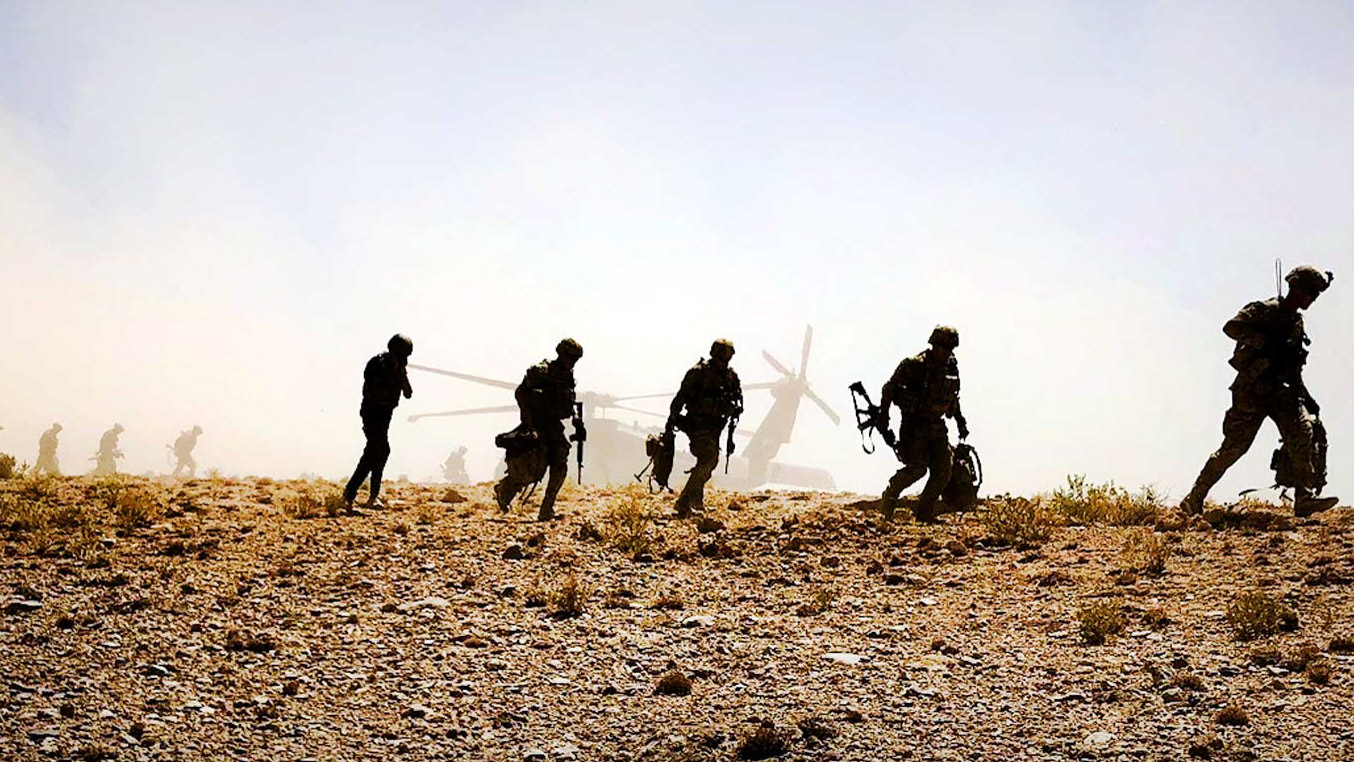
Soldiers set off for a foot patrol after disembarking from a UH-60 Black Hawk helicopter in Afghanistan. Photo: Spc. Markus Bowling/US Department of Defense
In his talk at the UOW Big Ideas Festival, Professor Farrell observed that "US reluctance to speak with the Taliban is perhaps understandable - given the way they had governed Afghanistan in 1990s. At the time, the country was wracked by civil war, and there was endemic abuse of civilians by gunmen. The Taliban rose up to bring law and order.
However, they also brought a strict form of Islamic rule enforced by harsh punishments. All men had to grow beards, women had to wear burqas, and music was banned - as was toothpaste oddly enough, and kite flying. People were publicly flogged for minor crimes and mutilated for more serious ones.
Girls over the age of eight were not allowed to go to school, and women were largely confined to their homes. The West looked on in horror at the deprivations under Taliban rule.
"It's a very challenging area because Afghanistan is full of different groups. It's a heavily militarised society radicalised by decades of war. But the failure to talk to the Taliban has been critical.
"The reason why time is so important is that up to 2010, the Americans were pouring troops into Afghanistan. By 2010, there were 100,000 soldiers in Afghanistan with another 40,000 allies. It's a great time to start peace talks because you have a huge army and you're building the army up. But by 2012, the US were pulling their forces out very quickly. If you're pulling forces out, you lose leverage in the peace talks.
"So why would the United State make peace with the Taliban? The short answer is because it has no choice."
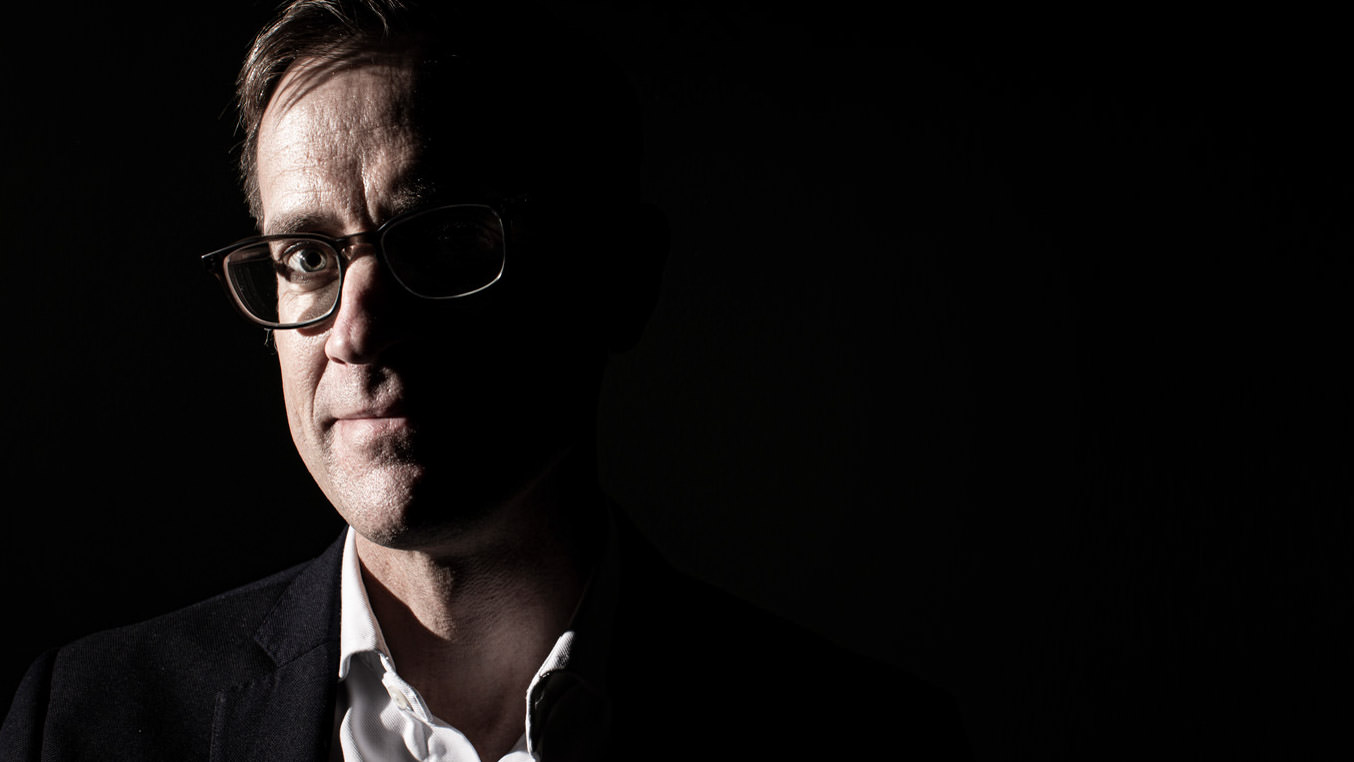
President Trump also vowed to end the war on the campaign trail, and Professor Farrell says he was surprised to see this promise continue into the Oval Office. Indeed, in September 2019, it looked as if peace was closer than it had ever been. There were reports that an end to the Afghanistan War was imminent. Until it wasn't.
President Trump's ham-fisted approach to diplomacy had struck again. It was announced that peace talks had collapsed. To a stunned nation, Trump revealed that he had invited the Taliban to Camp David, a retreat for the United State presidents in the mountains of Maryland, in the same week as the 18th anniversary of the September 11 attacks.
Camp David has been the site of countless diplomatic meetings and tête à têtes. Yet the idea of the Taliban on hallowed political ground was anathema to the American people and political class.
"Trump is the reason for the amazing progress in the talks and for why the deal collapsed," Professor Farrell says. "To be fair, Trump is an unlikely peacemaker. As President, he has threatened nuclear war against North Korea and is waging a trade war against China. However, he is no fan of the Afghanistan war. He has long promised to bring US troops home. The imperative to do so before the 2020 Presidential elections drove forward the current talks towards deal.
"And then, Trump's ego took over. Against all advice, he invited the Taliban to meet with him in person at the presidential retreat in Camp David. He also invited Afghan President, Ashraf Ghani, to join the meeting. Trump wanted to be seen to close the deal. Instead, he caused the whole thing to unravel. For reasons that are still unclear, he called off the meeting and vowed that the US would hit the Taliban harder than ever before. Trump the supposed peacemaker showed his true colours."
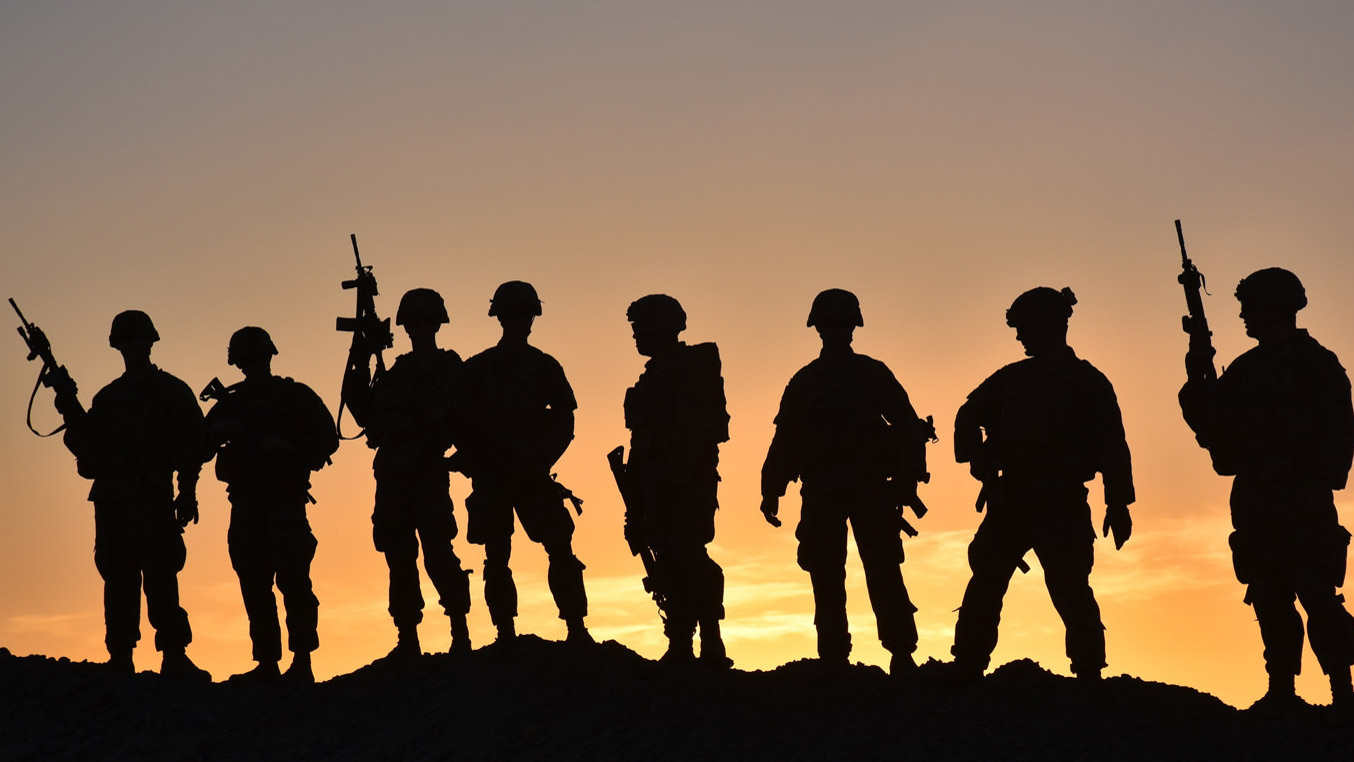
Soldiers from Task Force Stalwart, composed of soldiers from 1st Battalion, 41st Infantry Regiment, 2nd Brigade Combat Team, 4th Infantry Division, pose for a group photo in Afghanistan in 2018. Photo: Sgt. 1st Class Jasmine L. Flowers/US Department of Defense
Professor Farrell says diplomacy is still the only option to finally end the unwinnable war in Afghanistan. Yet, there is every indication that the path to peace will continue to be elusive for the current leader of the United States, who claims he has closed the door on further talks. With a bruising presidential election on the horizon in 2020, the future is uncertain.
"Afghanistan remains mired in conflict. In August, more civilians were killed there than in the conflicts in Syria and Yemen combined. The Afghan people have a long and difficult road ahead of them. However, talking to the Taliban remains the best hope for peace."
Main photo courtesy of the Australian Department of Defence